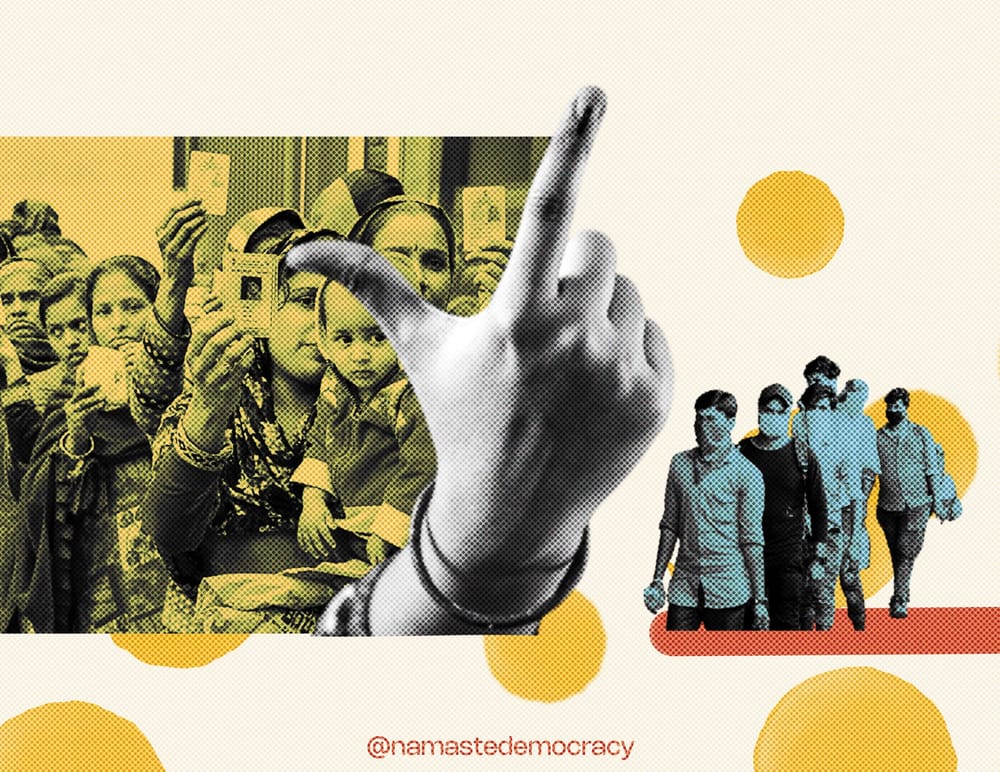The Migrant’s Manual to Voting
While the world’s largest democracy awaits the Lok Sabha elections of 2024 and its outcomes, the Election Commission of India (ECI) is industriously active in ensuring a free, fair and accessible election process. With seven polling phases spread over 44 days, there are 98.6 crore eligible voters enrolled on the Indian electoral list. The voter statistics are Herculean, and the universal adult franchise in India is robust in its layers that cascade from the union level to the grassroots of India. While the 2024 elections are monumentally significant in occupying our minds at present, it is the electoral past of India that are powerful reminders of what it means to make a vote count. A glimpse at the 67.4% voter turnout of 2019 Lok Sabha polls presents the case of the 30 crore ‘Lost Votes.’ One of the compelling reasons behind the lost votes was migration-based disenfranchisement.
India has the largest migrant population with over 40 crore individuals. Indian internal migrants and international migrants aged over 18 years are both eligible to vote under the ‘General Elector’ and ‘Overseas Elector’ category respectively. Yet, for individuals who are seasonal or temporary migrants oscillating between cities for work, enrolling at a new destination, time and time again, may not seem most ideal. However, registering in a new constituency after changing residences is bound to save your time and resources as it will spare you the travel costs of having to go back to your hometown or old registered constituency to vote. The process is fairly straightforward provided you have the required documents.
For any elector, a voter ID is pivotal in the voting process as it is issued by the Election Commission of India (ECI) with a ten-digit EPIC number to identify electors in the list. You can apply for a voter ID anytime during the year either by visiting your local electoral office or by logging in to the Voter’s Service Portal crafted by the Election Commission of India to bring forth the digital convenience to your doorstep. To apply for a Voter ID, you need to:
- Complete your application on Form 6 if you are a general voter or Form 6A if you are a NRI (Non-Residential India).
- Upload relevant, scanned documents for proof of age, address and identity.
You can submit and track your application status on the Voter Portal or the Voter Helpline App that is available on both Android and iOS. A BLO (Booth Level Officer) will be assigned to approve your application. It is important to remember that you can only be registered in the electoral roll of one constituency at a time that is relevant to your current address. If you have an existing voter ID but need to apply for updations, use the following forms:
- Form 8: To update details regarding shifting residences/ correction of entries in existing electoral roll/ replacement of EPIC/ update status to PwD (Person with Disability)
- Form 8A: To switch constituencies.
- Form 7: Deletion of the name of a shifted / dead / absentee elector from the electoral roll and deletion of duplicate entry
If you need a completely new ID, go ahead and fill Form 6!
If you are a student residing at hostels provided by educational institutions or elsewhere away from home, you have the option to get yourself registered as an elector at your native place with your parents’ or at the current address of your university where you are resident for the time being. According to the ECI norms, the course pursued by you should be recognized by Central / State Governments / Boards / Universities / Deemed Universities and such courses should be of not less than 1 year's duration. If you want to enrol yourself at the university’s current location, you will have to attach a bonafide certificate (as per the specimen at Annexure II of Guidelines attached to Form 6) from the Headmaster / Principal / Director / Registrar / Dean of your educational institution with Form 6.
Apart from these facilities, the ECI has made substantial efforts to improve the technical landscape of voting. Special arrangements for migrant voters from Jammu and Kashmir to vote via postal ballots or special polling booths set up in Delhi, Udhampur and Jammu according to a notification issued by the ECI. It must be noted that there is no central database on migration in the country, but available data suggests education, marriage and work as prominent reasons for domestic migrations. The ECI had developed a prototype Multi-Constituency Remote Electronic Voting Machine (RVM) which could potentially handle multiple constituencies upto 72 from a single remote polling booth. On January 16th, 2023, the Commission demonstrated the RVM to representatives of political parties. Although there is no notification on its implementation for the 2024 Lok Sabha polls, the proposed RVM system could enable domestic migrants to cast votes from remote locations in the future and tackle the issue of migrant dis-enfranchisement.
Nonetheless, the existing facilities to enrol as a voter or update your enrollment details are fairly simple and accessible. In the constant whirlpools of demands presented by everyday life, selecting the furniture for your new house or adapting to the flavours of the hostel food may just be one of the many challenges that put you to trial in a new city. We are here to remind you that the Voter ID is just as much a priority and the ballots await your vote!



